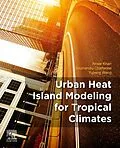Urban Heat Island Modeling for Tropical Climates takes into account the different urban physics in tropical environments, presenting a way of UHI scaling for tropical cities. Topics include measuring, modeling and proper mitigation strategies, which account for the surface energy balance of tropics. Tropical cities are more susceptible to the effects of projected global warming because of conditions in tropical climates and the rapid growth of so many cities in this zone. The need for research on measuring, modeling and mitigation of UHI effects in tropical cities is of growing importance. This book walks through the basics of Urban Heat Islands, including causes, measurement and analysis then expands upon issues as well as the novel techniques that can be used to address issues specific to the region. - Reviews topics related to understanding the fundamentals of modeling and impacts of urban heat islands - Covers many techniques, from remote sensing, to numerical modeling and then applying them to urban climate studies in general, and in tropical cities - Describes the scaling of urban heat islands based on long-term seasonal thermal parameters as feature-based classification systems using a probabilistic and fuzzy logic approach, unlike local climate zones (LCZs)
Autorentext
Ansar Khan is an assistant professor of geography at Lalbaba College, University of Calcutta in India. A global leader in the field of urban climate research, his work incorporates simulation and numerical modeling of tropical climatic events. A key focus of his research is searching for appropriate mitigation strategies and technologies to decrease the overheating of tropical urban areas while also decreasing energy consumption and protecting health.
Klappentext
Urban Heat Island Modeling for Tropical Climates takes into account the different urban physics in tropical environments, presenting a way of UHI scaling for tropical cities. Topics include measuring, modeling and proper mitigation strategies, which account for the surface energy balance of tropics. Tropical cities are more susceptible to the effects of projected global warming because of conditions in tropical climates and the rapid growth of so many cities in this zone. The need for research on measuring, modeling and mitigation of UHI effects in tropical cities is of growing importance.
This book walks through the basics of Urban Heat Islands, including causes, measurement and analysis then expands upon issues as well as the novel techniques that can be used to address issues specific to the region.
- Reviews topics related to understanding the fundamentals of modeling and impacts of urban heat islands
- Covers many techniques, from remote sensing, to numerical modeling and then applying them to urban climate studies in general, and in tropical cities
- Describes the scaling of urban heat islands based on long-term seasonal thermal parameters as feature-based classification systems using a probabilistic and fuzzy logic approach, unlike local climate zones (LCZs)
Inhalt
1. Context and Background of Tropical Urban Heat Island
2. Characterizing Thermal Fields and Evaluating UHI Effects
3. UHI Drivers in Modeling Urban Thermal Environment
4. Scaling UHI and Microclimate Environment
5. WRF/UCM Simulation for City-scale UHI Modeling
6. Simulating Micro-scale Thermal Interactions using ENVI-met Climate Model
7. Future Research for Tropical UHI
